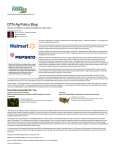Berkeley soda tax: Volume of SSBs sold decreased by 9.6% in first year, says study

Meanwhile, sales of bottled water rose by 15.6%, while overall sales of untaxed ‘healthier beverages’ rose 3.5%. Overall beverage sales increased.
Berkeley, California, US passed the first large tax on sugar-sweetened beverages in the US in November 2014, at one cent per ounce. The tax came into effect on March 1, 2015.
With other jurisdictions set to follow on soda taxes, the authors of the study say the Berkeley tax offers the first opportunity to evaluate the policy, and their study considered the first year of implementation (March 2015 – February 2016).
Given that Berkeley’s per capita soda consumption was already relatively low, the authors believe that SSB taxes will have a larger impact in the other US cities that are considering the measure.
Price of 2 liter soda bottle rises by 68c
The study, conducted by the Public Health Institute and University of North Carolina, is believed to be the largest evaluation of the US’ first soda tax, covering 15.5m supermarket checkouts.
The Berkeley SSB tax was introduced with the goal of reducing consumption of sugary beverages and raising revenue for efforts to prevent obesity and diabetes.
It applies to regular soda, energy drinks, sports drinks, sweetened juice drinks, flavored waters, RTD sweetened coffees and teas.
Theoretically, a one cent per ounce tax would typically increase the price of a $2, two-liter bottle of soda by 68c; or increase the price of a $1 can (12 ounces) by 12c.
In the 15.5m supermarket checkouts studied, 67% of the amount of the tax was passed on to consumers across all SSBs, and the tax was fully passed through for sodas and energy drinks.
The study found that the volume of sugar sweetened beverages sold in Berkeley declined by 9.6% in the year following implementation; sales of healthier beverages rose (meaning there was no negative impact on overall beverage sales); and overall grocery bills (consumer spending per checkout) did not go up.
Sales of diet soft drinks and diet energy drinks also fell ‘significantly’, by 9.2%.
‘Sales in ounces of taxed SSBs fell by 9.6% in relation to predicted sales in the absence of the tax, while sales of untaxed beverages rose 3.5% and total beverage sales rose in Berkeley. Consumer spending per transaction (average grocery bill) did not increase, nor did store revenue fall more in Berkeley, while SSB sales rose 6.9% in comparison cities.’
Lead author Lynn Silver, MD, MPH, of the Oakland-based Public Health Institute, said: “The Berkeley tax is a home run— residents chose healthier options, it raised revenue for promoting health, and we saw no evidence of higher grocery bills for consumers or harm to local business revenue.
“These findings suggest that sugary drink taxes make health and economic sense.”
The city’s tax revenue over the first year of the SSB tax was $1,416,973 (approximately $12 per capita), and proceeds are being used for child nutrition and community health programs.
Limitations
The authors acknowledge that their observational study cannot establish causal links between SSB taxes and changes in measured outcomes, nor assess health outcomes.
“It cannot distinguish the longer-term effects of education and intensive media debate on SSBs in the communities surrounding the San Francisco Bay as a result of tax and other pre-existing campaigns in both Berkeley and San Francisco in 2014, although baseline store price survey and consumption data were collected after those campaigns but before tax implementation, mitigating this issue somewhat,” they explain.
Pending soda taxes: US & beyond
Similar taxes have recently been passed in San Francisco, Oakland & Albany in California, Philadelphia (PA), Cook County (IL) & Boulder (CO). They are also under consideration in Santa Fe (NM), Seattle (WA), Illinois, Massachusetts & Washington.
Taxes on SSBs are also set to be introduced in the UK (April 2018) & South Africa.
The authors conclude that implementing a SSB tax is ‘feasible’ and believe that their findings from the Berkeley tax show promise for such policies in other jurisdictions.
“Significant declines in SSB sales, even in this relatively affluent community, accompanied by revenue used for prevention suggest promise for this policy,” they write in the study.
“Evaluation of taxation in jurisdictions with more typical SSB consumption, with controls, is needed to assess broader dietary and potential health impacts.”
The study was supported by Bloomberg Philanthropies. Data was collected by the Public Health Institute and its Survey Research Group, with the collaboration of local retailers and grocery chains.
Study: Silver LD, Ng SW, Ryan-Ibarra S, Taillie LS, Induni M, Miles DR, Poti JM, Popkin BM. (2017) Changes in prices, sales, consumer spending, and beverage consumption one year after a tax on sugar- sweetened beverages in Berkeley, California, US: A before-and-after study. PLoS Med 14(4): e1002283. https://doi.org/10.1371/journal.pmed.1002283



















